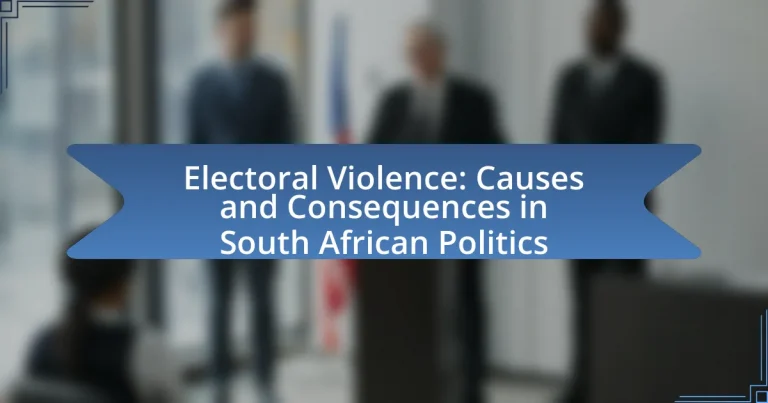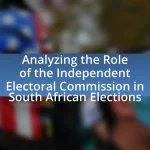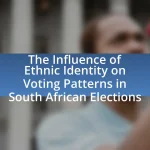Electoral violence in South African politics refers to the use of physical force or intimidation during elections, aimed at influencing outcomes and intimidating voters. This article examines the causes and consequences of electoral violence, highlighting its manifestations during elections, the historical factors contributing to its prevalence, and the implications for democracy and governance. Key aspects include the role of political rivalries, socio-economic disparities, and inadequate law enforcement, as well as the impact on voter turnout, community relations, and public trust in political institutions. The article also discusses strategies for mitigating electoral violence, including civil society involvement and electoral reforms.
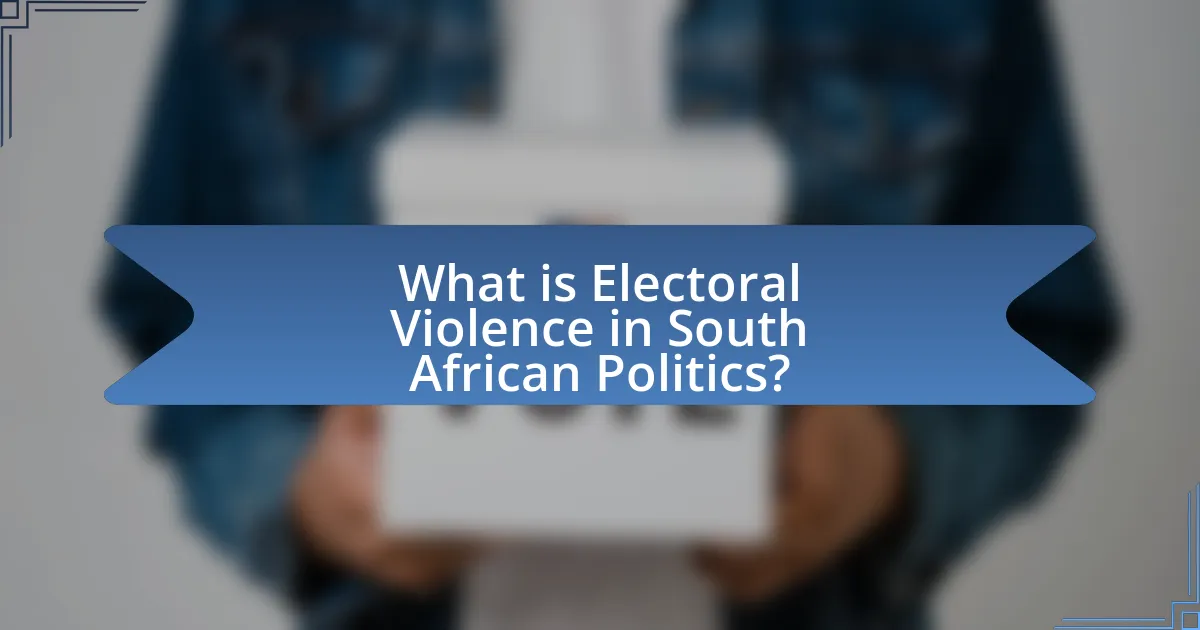
What is Electoral Violence in South African Politics?
Electoral violence in South African politics refers to the use of physical force or intimidation during electoral processes, aimed at influencing the outcome of elections. This phenomenon has been characterized by incidents such as assaults, threats, and even killings, particularly during party primaries and general elections. For instance, the 2016 local government elections saw a notable increase in violence, with reports indicating that over 20 people were killed in politically motivated attacks. Such violence often stems from competition among political parties, factionalism within parties, and socio-economic disparities, which exacerbate tensions. The Electoral Commission of South Africa has documented these incidents, highlighting their detrimental impact on democratic processes and voter participation.
How is electoral violence defined in the South African context?
Electoral violence in the South African context is defined as acts of violence that occur during electoral processes, aimed at influencing the outcome of elections or intimidating voters and candidates. This includes physical assaults, threats, and other forms of coercion that disrupt the electoral environment. The South African Human Sciences Research Council has documented instances of such violence, highlighting its prevalence in party political conflicts, particularly during local elections, where competition for power can lead to violent confrontations.
What are the key characteristics of electoral violence?
Electoral violence is characterized by acts of aggression and intimidation that occur during electoral processes. These acts can manifest as physical assaults, threats, and coercion aimed at voters, candidates, or political parties. Historical data from South Africa indicates that such violence often escalates during election periods, with incidents linked to political rivalry and competition for power. For instance, the 2014 elections in South Africa saw numerous reports of violence, including attacks on party members and disruptions at polling stations, highlighting the pervasive nature of electoral violence in the political landscape.
How does electoral violence manifest during elections?
Electoral violence manifests during elections through physical assaults, intimidation, and the destruction of property, primarily targeting political opponents and their supporters. In South Africa, this violence often escalates in the lead-up to elections, with incidents such as clashes between rival party members, attacks on campaign events, and threats against voters. For instance, the 2016 local elections saw numerous reports of violence, including the murder of political candidates, highlighting the severe risks associated with political competition in the country. This pattern of violence is often fueled by political rivalry, socio-economic disparities, and a history of conflict, making it a significant concern for electoral integrity and democratic processes.
What historical factors contribute to electoral violence in South Africa?
Historical factors contributing to electoral violence in South Africa include the legacy of apartheid, socio-economic disparities, and political competition. The apartheid system, which enforced racial segregation and oppression, created deep-seated grievances among marginalized communities. Following the end of apartheid in 1994, the transition to democracy did not fully address these inequalities, leading to persistent poverty and unemployment, particularly in black communities. Additionally, intense competition among political parties, especially between the African National Congress and the Economic Freedom Fighters, often escalates tensions, resulting in violent confrontations during elections. These factors collectively foster an environment where electoral violence can occur, as evidenced by incidents reported during various elections since 1994.
How has the legacy of apartheid influenced current electoral violence?
The legacy of apartheid has significantly influenced current electoral violence in South Africa by perpetuating deep-seated socio-economic inequalities and political tensions. The historical context of apartheid, which enforced racial segregation and disenfranchisement, has led to ongoing struggles for power among various political factions, particularly between the African National Congress and opposition parties. This competition often escalates into violence, as evidenced by the increase in politically motivated attacks during election periods, with reports indicating that over 30 political killings occurred in the lead-up to the 2019 elections. Additionally, the lack of trust in electoral processes and institutions, rooted in the apartheid era, contributes to a volatile political environment where violence is seen as a means to achieve political ends.
What role do political party rivalries play in electoral violence?
Political party rivalries significantly contribute to electoral violence by intensifying competition and fostering hostility between opposing factions. In South Africa, historical tensions stemming from apartheid-era divisions have led to violent confrontations during elections, as parties vie for power and influence. For instance, the rivalry between the African National Congress (ANC) and the Economic Freedom Fighters (EFF) has resulted in clashes, with reports indicating that such confrontations often escalate into violence, particularly in areas with a history of political conflict. Data from the South African Police Service shows a correlation between election periods and spikes in politically motivated violence, underscoring the role of party rivalries in creating an environment conducive to electoral unrest.
What are the implications of electoral violence for democracy in South Africa?
Electoral violence significantly undermines democracy in South Africa by eroding public trust in electoral processes and institutions. This violence creates an environment of fear and intimidation, discouraging voter participation and skewing electoral outcomes. For instance, the 2019 elections saw increased incidents of violence, which led to a reported decline in voter turnout to 65%, down from 76% in 2014. Such trends indicate that electoral violence not only affects immediate electoral results but also has long-term implications for political stability and governance in the country.
How does electoral violence affect voter turnout and participation?
Electoral violence significantly decreases voter turnout and participation. Research indicates that when violence occurs during elections, it instills fear among voters, leading to lower engagement in the electoral process. For instance, a study by the Electoral Institute for Sustainable Democracy in Africa found that in regions with high levels of electoral violence, voter turnout dropped by as much as 30% compared to peaceful areas. This decline in participation is often due to concerns for personal safety and the perception that the electoral process is illegitimate or manipulated.
What impact does electoral violence have on public trust in political institutions?
Electoral violence significantly undermines public trust in political institutions. When violence occurs during elections, it creates an environment of fear and instability, leading citizens to perceive political processes as illegitimate. Research indicates that in South Africa, incidents of electoral violence have been linked to decreased voter turnout and increased skepticism towards the electoral system, as seen in the 2016 local elections where violence led to a 10% drop in participation in affected areas. This erosion of trust can result in long-term disengagement from political participation, further weakening democratic institutions.
How does electoral violence affect different communities in South Africa?
Electoral violence significantly affects different communities in South Africa by exacerbating social divisions and instilling fear among voters. Communities often experience heightened tensions, leading to increased polarization along ethnic and political lines, which can result in community members feeling unsafe and reluctant to participate in the electoral process. For instance, during the 2016 local elections, reports indicated that violence in areas like KwaZulu-Natal led to the displacement of families and a decrease in voter turnout, illustrating the direct impact of violence on civic engagement. Furthermore, the South African Human Sciences Research Council noted that electoral violence contributes to a cycle of retribution and instability, further entrenching divisions within communities.
What are the experiences of marginalized communities during elections?
Marginalized communities in South Africa often experience significant challenges during elections, including intimidation, violence, and disenfranchisement. These communities frequently face threats from political factions aiming to control voter turnout and influence election outcomes. For instance, a report by the Electoral Commission of South Africa indicated that incidents of electoral violence disproportionately affect areas with high levels of poverty and unemployment, which are often home to marginalized groups. Additionally, systemic barriers such as inadequate access to polling stations and lack of voter education further exacerbate their difficulties, leading to lower voter participation rates among these populations.
How does electoral violence influence community relations and cohesion?
Electoral violence significantly undermines community relations and cohesion by fostering mistrust and fear among residents. When violence occurs during elections, it often leads to divisions along political, ethnic, or social lines, which can result in long-lasting animosities. For instance, research conducted by the Institute for Security Studies in South Africa indicates that electoral violence can lead to increased polarization within communities, as individuals may align more closely with their political affiliations rather than with their neighbors. This polarization can disrupt social networks and diminish community solidarity, making it difficult for residents to collaborate on local issues or engage in communal activities. Furthermore, the psychological impact of violence can create an environment of insecurity, where individuals feel threatened and are less likely to participate in civic life, further eroding community cohesion.
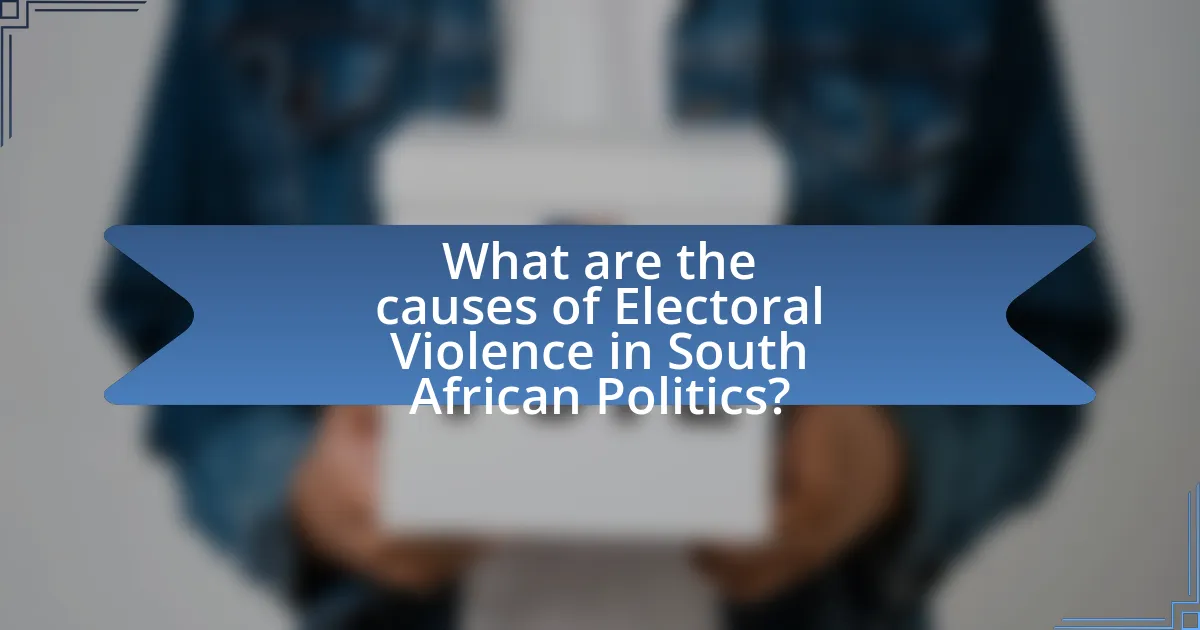
What are the causes of Electoral Violence in South African Politics?
Electoral violence in South African politics is primarily caused by political rivalry, socio-economic disparities, and inadequate law enforcement. Political rivalry often manifests in intense competition among parties, leading to confrontations and violence, particularly in areas with a history of factionalism. Socio-economic disparities contribute to frustration and unrest, as marginalized communities may resort to violence to express their grievances during elections. Additionally, inadequate law enforcement exacerbates the situation, as the police may be ill-equipped or unwilling to intervene effectively in violent incidents, allowing conflicts to escalate. Historical context shows that these factors have been persistent in South Africa’s electoral landscape, influencing the frequency and intensity of electoral violence.
What socio-economic factors contribute to electoral violence?
Socio-economic factors that contribute to electoral violence include poverty, unemployment, and inequality. In South Africa, high levels of poverty and unemployment, particularly among youth, create a fertile ground for frustration and discontent, which can escalate into violence during elections. Additionally, socio-economic inequality exacerbates tensions between different communities, leading to conflicts over resources and political representation. Research by the Institute for Security Studies indicates that areas with higher unemployment rates and economic disparities are more prone to electoral violence, highlighting the direct correlation between these socio-economic conditions and the likelihood of violent electoral incidents.
How does poverty and unemployment relate to electoral violence?
Poverty and unemployment significantly contribute to electoral violence by creating an environment of frustration and desperation among the populace. When individuals face economic hardship, they may resort to violence as a means of expressing their discontent or seeking change. For instance, research indicates that high unemployment rates, particularly among youth, correlate with increased incidences of political unrest and violence during elections. A study by the Institute for Security Studies found that areas with higher poverty levels experienced more electoral violence, as marginalized groups often feel excluded from the political process and may turn to violent actions to assert their demands. This relationship underscores the importance of addressing economic disparities to mitigate the risk of electoral violence in South Africa.
What role does access to resources play in electoral conflicts?
Access to resources significantly influences electoral conflicts by determining the capacity of political actors to mobilize support and engage in violence. In South Africa, unequal access to resources, such as funding, media, and infrastructure, exacerbates tensions among competing political factions. For instance, during the 2014 elections, the African National Congress (ANC) utilized its substantial financial resources to dominate media coverage and campaign efforts, while smaller parties struggled to gain visibility, leading to heightened competition and conflict. Additionally, control over local resources can incite violence, as seen in areas where rival factions vie for access to state resources, resulting in clashes and intimidation. This dynamic illustrates how resource disparities can escalate electoral conflicts, undermining democratic processes and stability.
How do political dynamics influence electoral violence?
Political dynamics significantly influence electoral violence by shaping the behavior of political actors and the environment in which elections occur. In South Africa, factors such as party competition, historical grievances, and socio-economic disparities contribute to heightened tensions during elections. For instance, the rivalry between the African National Congress and the Economic Freedom Fighters has led to violent confrontations, as evidenced by incidents reported during the 2019 elections where clashes resulted in injuries and arrests. Additionally, the legacy of apartheid continues to fuel political polarization, exacerbating conflicts over resources and representation, which can escalate into violence. Thus, the interplay of these dynamics creates a volatile atmosphere that can trigger electoral violence.
What strategies do political parties use that may incite violence?
Political parties may incite violence through strategies such as mobilizing supporters with inflammatory rhetoric, engaging in voter intimidation, and fostering divisions along ethnic or social lines. For instance, during the 1994 South African elections, political parties utilized aggressive language that heightened tensions between rival factions, leading to violent confrontations. Additionally, the African National Congress (ANC) and the Inkatha Freedom Party (IFP) were known to employ tactics that included orchestrating violent clashes to assert dominance in contested areas, which resulted in significant electoral violence. These strategies demonstrate how political parties can exploit societal divisions and escalate conflicts, ultimately undermining democratic processes.
How does the behavior of political leaders impact electoral violence?
The behavior of political leaders significantly impacts electoral violence by shaping the political climate and influencing the actions of their supporters. When leaders engage in inflammatory rhetoric, promote divisive narratives, or fail to condemn violence, they can incite their followers to commit acts of aggression against opponents. For instance, during the 2019 South African elections, the rhetoric used by certain political figures contributed to heightened tensions and instances of violence, as evidenced by reports from the Electoral Commission of South Africa, which noted increased incidents of intimidation and violence in various regions. Additionally, leaders who foster a culture of impunity by not holding perpetrators accountable further exacerbate the situation, leading to a cycle of violence that undermines democratic processes.
What role does law enforcement play in electoral violence?
Law enforcement plays a critical role in managing electoral violence by maintaining public order and ensuring the safety of voters and candidates during elections. Their presence can deter potential violence, as seen in South Africa where increased police deployment during elections has been linked to reduced incidents of electoral-related conflicts. For instance, the South African Police Service reported a decrease in electoral violence during the 2019 elections compared to previous years, attributed to proactive measures and strategic planning by law enforcement agencies. Effective law enforcement can thus mitigate risks associated with electoral violence, promoting a safer electoral environment.
How effective are police responses to electoral violence incidents?
Police responses to electoral violence incidents in South Africa are often criticized for being ineffective. Studies indicate that police frequently lack adequate training and resources to manage such situations, leading to escalated violence rather than resolution. For instance, the South African Human Rights Commission reported that police responses during the 2016 local elections were insufficient, with many incidents of violence going unaddressed. Furthermore, the lack of timely intervention has been linked to increased casualties and a perception of impunity among perpetrators. This evidence underscores the challenges faced by law enforcement in effectively addressing electoral violence.
What challenges do law enforcement agencies face during elections?
Law enforcement agencies face significant challenges during elections, primarily including managing electoral violence, ensuring public safety, and maintaining order. These challenges are exacerbated by heightened tensions among political factions, which can lead to confrontations and unrest. For instance, during the 2019 South African elections, reports indicated an increase in politically motivated violence, necessitating a robust police presence to prevent escalation. Additionally, law enforcement must navigate the complexities of crowd control, misinformation, and the potential for voter intimidation, all of which can undermine the electoral process and public trust in democratic institutions.
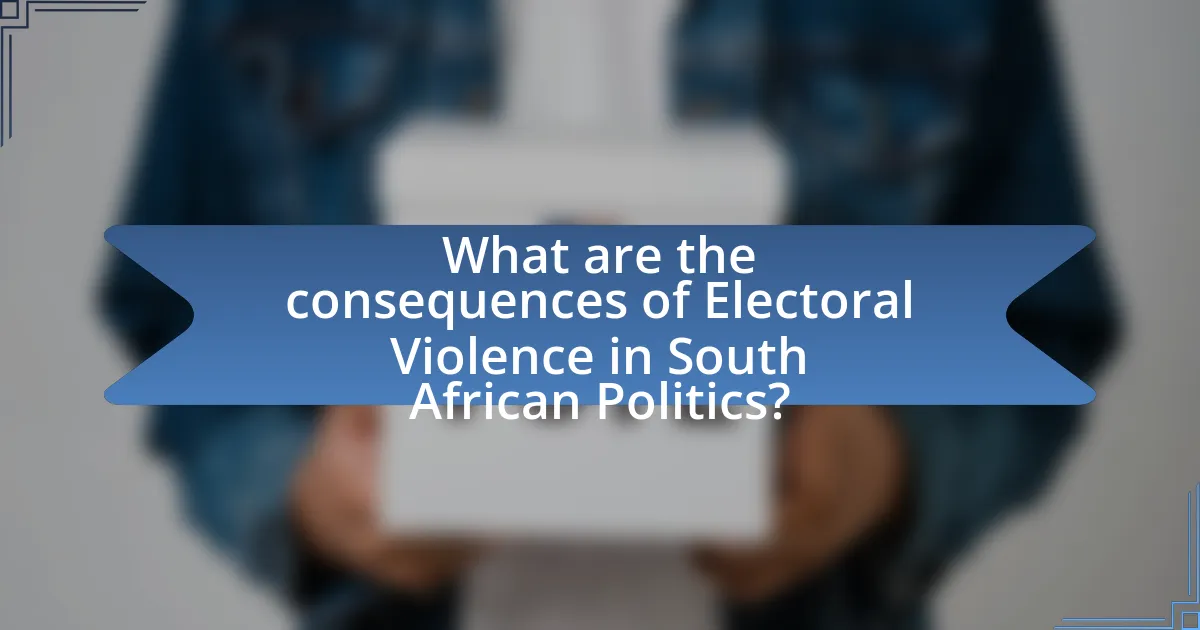
What are the consequences of Electoral Violence in South African Politics?
Electoral violence in South African politics leads to significant consequences, including undermined democratic processes, increased political instability, and heightened social tensions. The disruption of elections due to violence can result in a lack of legitimate representation, as seen in the 1994 elections where violence affected voter turnout and trust in the electoral system. Additionally, electoral violence often escalates conflicts between political factions, contributing to a cycle of retaliation and further violence, as evidenced by incidents during the 2016 local elections. This instability can deter foreign investment and economic growth, as investors seek stable environments, impacting overall national development.
How does electoral violence affect the political landscape in South Africa?
Electoral violence significantly destabilizes the political landscape in South Africa by undermining democratic processes and fostering an environment of fear. This violence often leads to voter intimidation, which can suppress turnout and skew election results in favor of more aggressive political factions. For instance, the 2016 local elections saw increased incidents of violence, with reports indicating that over 20 people were killed in politically motivated attacks, illustrating how such violence can directly influence electoral outcomes. Furthermore, the prevalence of electoral violence contributes to a cycle of mistrust among citizens towards political institutions, diminishing public confidence in the electoral system and potentially leading to increased political apathy.
What changes occur in party dynamics due to electoral violence?
Electoral violence significantly alters party dynamics by fostering distrust among political factions and leading to increased polarization. This violence often results in the fragmentation of party alliances, as parties may distance themselves from perceived aggressors or seek to consolidate power by forming new coalitions. For instance, in South Africa, incidents of electoral violence have historically prompted parties to adopt more aggressive campaigning strategies, which can escalate tensions and further divide the electorate. Additionally, the fear of violence can suppress voter turnout, disproportionately affecting parties that rely on grassroots support, thereby shifting the balance of power toward more established or violent factions.
How does electoral violence shape future electoral strategies?
Electoral violence significantly influences future electoral strategies by prompting political parties to adapt their approaches to campaigning and voter engagement. In South Africa, historical instances of electoral violence, such as the violent conflicts during the 1994 elections, have led parties to prioritize security measures and community outreach to mitigate risks and build trust among voters. For example, the African National Congress (ANC) has implemented strategies that focus on dialogue and conflict resolution to prevent violence, demonstrating a direct response to past electoral conflicts. This adaptation is essential for ensuring voter turnout and maintaining political stability, as evidenced by the increased emphasis on peaceful campaigning and the establishment of monitoring bodies to oversee electoral conduct in subsequent elections.
What are the social consequences of electoral violence?
Electoral violence leads to significant social consequences, including increased polarization, erosion of trust in democratic institutions, and heightened community tensions. In South Africa, incidents of electoral violence have been linked to a rise in social divisions, as communities become fragmented along political lines. Research indicates that such violence undermines public confidence in electoral processes, with studies showing that areas experiencing electoral violence report lower voter turnout and diminished civic engagement. Furthermore, the aftermath of electoral violence often results in long-lasting trauma within affected communities, perpetuating cycles of violence and instability.
How does electoral violence impact community safety and security?
Electoral violence significantly undermines community safety and security by instilling fear and disrupting social cohesion. This type of violence often leads to increased crime rates, as communities become more vulnerable during periods of unrest. For instance, a study by the Institute for Security Studies found that electoral violence in South Africa has resulted in heightened tensions and a breakdown of trust among community members, leading to a rise in vigilantism and retaliatory violence. Furthermore, the South African Human Sciences Research Council reported that such violence can displace populations, creating unsafe living conditions and exacerbating existing social inequalities.
What are the psychological effects of electoral violence on citizens?
Electoral violence has significant psychological effects on citizens, including increased anxiety, fear, and trauma. Citizens exposed to electoral violence often experience heightened levels of stress and post-traumatic stress disorder (PTSD), which can lead to long-term mental health issues. Research indicates that communities affected by such violence report a decline in social cohesion and trust, exacerbating feelings of isolation and helplessness. For instance, a study conducted by the Human Sciences Research Council in South Africa found that individuals who witnessed electoral violence were more likely to develop anxiety disorders and depressive symptoms compared to those who did not experience such events. This evidence underscores the profound impact of electoral violence on the psychological well-being of citizens.
What are the long-term implications of electoral violence for governance?
Electoral violence has significant long-term implications for governance, including weakened institutions, diminished public trust, and increased political instability. Over time, repeated incidents of electoral violence can erode the legitimacy of governmental authority, leading to a cycle of violence and repression. For instance, in South Africa, the violence surrounding elections has historically resulted in a lack of confidence in electoral processes, as evidenced by declining voter turnout rates and increased public disillusionment with political parties. This erosion of trust can hinder effective governance, as citizens may become disengaged from political participation, further destabilizing the political landscape. Additionally, the normalization of violence in electoral contexts can lead to the entrenchment of corrupt practices and the marginalization of opposition voices, ultimately undermining democratic principles and governance structures.
How does electoral violence affect policy-making and implementation?
Electoral violence significantly undermines policy-making and implementation by creating an environment of instability and fear. This instability often leads to a prioritization of security measures over developmental policies, as governments focus on maintaining order rather than addressing pressing social issues. For instance, in South Africa, incidents of electoral violence have historically resulted in the diversion of resources away from essential services, such as education and healthcare, towards policing and military interventions. This shift not only hampers effective governance but also erodes public trust in political institutions, making it difficult for policymakers to engage communities in the implementation of policies. Consequently, the cycle of violence perpetuates a lack of accountability and responsiveness in governance, further complicating the policy landscape.
What are the implications for international perceptions of South African democracy?
International perceptions of South African democracy are significantly influenced by the prevalence of electoral violence, which undermines the legitimacy of democratic processes. The occurrence of violent incidents during elections raises concerns among foreign observers regarding the stability and integrity of South Africa’s political system. For instance, the 2019 elections witnessed reports of intimidation and violence, leading to skepticism about the country’s commitment to democratic principles. Such perceptions can affect international relations, foreign investment, and aid, as countries may hesitate to engage with a nation perceived as politically unstable or undemocratic.
What strategies can be implemented to mitigate electoral violence?
To mitigate electoral violence, implementing comprehensive conflict resolution strategies is essential. These strategies include establishing dialogue platforms among political parties, enhancing community engagement to foster trust, and deploying neutral observers during elections to monitor and report incidents. Historical evidence from South Africa’s 1994 elections shows that dialogue and community involvement significantly reduced tensions, leading to a more peaceful electoral process. Additionally, the presence of independent monitors has been linked to decreased violence, as they help ensure transparency and accountability.
What role can civil society play in preventing electoral violence?
Civil society plays a crucial role in preventing electoral violence by promoting dialogue, fostering community engagement, and advocating for peaceful electoral processes. Organizations within civil society can mobilize citizens to participate in peaceful demonstrations, educate voters about their rights, and monitor electoral processes to ensure transparency. For instance, the South African Council of Churches has historically engaged in initiatives aimed at conflict resolution and promoting non-violence during elections, which has contributed to reducing tensions. Additionally, civil society can collaborate with governmental and international bodies to implement early warning systems that identify potential triggers of violence, thereby facilitating timely interventions.
How can electoral reforms contribute to reducing violence?
Electoral reforms can significantly contribute to reducing violence by promoting fairer electoral processes and enhancing political accountability. For instance, implementing proportional representation can ensure that diverse political voices are heard, reducing the marginalization of minority groups that often leads to conflict. Additionally, reforms such as independent electoral commissions can help ensure transparency and fairness in elections, which has been shown to decrease tensions and violence associated with perceived electoral fraud. A study by the International Foundation for Electoral Systems found that countries with robust electoral reforms experienced a 30% reduction in election-related violence compared to those without such measures.
